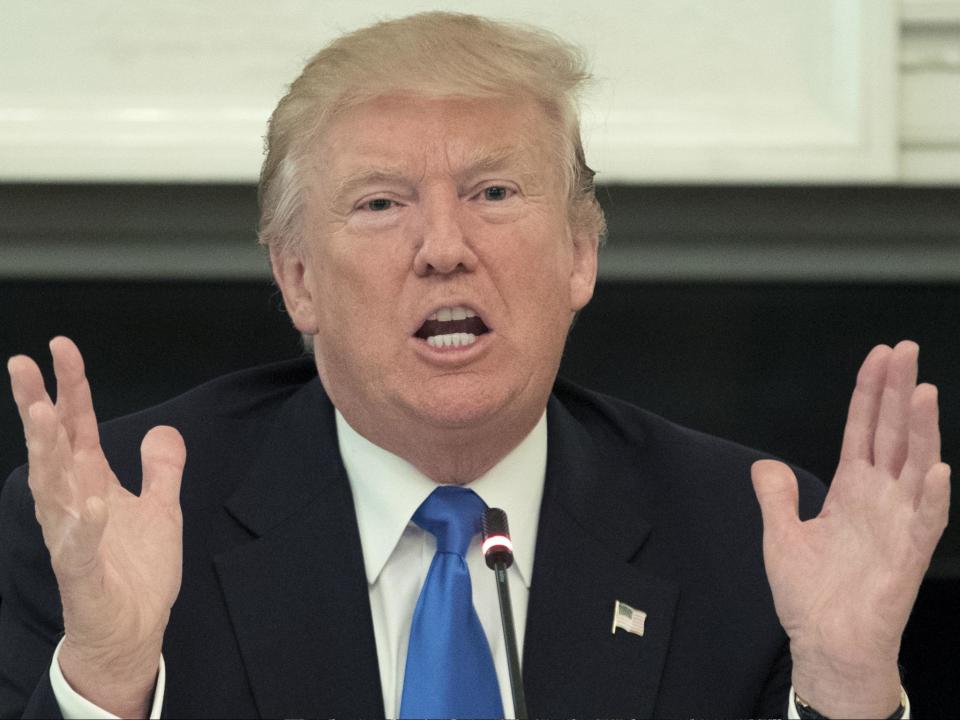Republican plan to repeal Obamacare without replacement will leave 32 million uninsured, says CBO

Donald Trump has declared that he wants to “let Obamacare fail” or “implode” in order to be able to replace it more easily as Republicans continue their party-internal debate on a suitable replacement.
“It’ll be a lot easier” to replace it if it fails, Mr Trump said at a White House lunch with 52 Republican Senators. “We’re not going to own it. I’m not going to own it. I can tell you the Republicans are not going to own it. We’ll let Obamacare fail, and then the Democrats are going to come to us.”
But the Congressional Budget Office has said the act's repeal would result in 27m more people without insurance, and 32m by 2026.
Senate Majority Leader Mitch McConnell has scheduled a vote to repeal Obamacare, with a two year period to allow Republicans to craft a bill that would pass.
But, can Obamacare collapse as the President thinks it can?
Robert Laszewski, President of consultancy Health Policy and Strategy Associates, told CNN Money he is convinced "the individual health insurance market will not collapse."
Most insurance providers “will stay [in marketplaces] and likely be in good shape financially in 2018," he said.
He cited Medicaid, the programme designed to provide government subsidised free care to low-income Americans, as one reason that he does not think Obamacare will “implode” the way Mr Trump is describing.
Obamacare has worked well in the 31 states that opted for the Medicaid expansion.
Approximately 11 million more people have access to healthcare as a result of the Obamacare expansion.
G. William Hoagland, Vice President of the Washington DC-based Bipartisan Center, told The Independent it all really depends on what the President meant by “fail”.
“If the definition means that coverage in the individual market is not achieved and premiums increase dramatically, the answer is yes,” Mr Hoagland said.
However, Mr Hoagland also explains a failure is dependent on what “actions the President himself takes without Congressional action” and where families and individuals live in the country.
For instance in California, there is a broad network of insurers and competition among them due to the size of the population.
In places like Alaska, West Virginia, or other specific counties within states where the populations are small and/or sparse - “access to care will be limited, insurance premiums in the individual market could increase at unaffordable rates and that would probably be defined as failure.”
As CNN Money reported, “there are roughly 25,000 people in 38 counties in Nevada, Ohio and Indiana at risk of suffering from an Obamacare failure next year.”
So, the Trump administration could paint a picture of failure based on evidence from these areas, even if they are in populous states.
For instance, Mr Hoagland explained that he is from Indiana and in that state “there are about three or four bare counties in the state primarily outside the metropolitan areas, the state overall would probably not be as impacted as those three or four counties.”
Mostly those in “primarily rural, low population or low density states would be most affected,” he said.
These also happen to be the areas where Mr Trump did well in the 2016 election among white populations.
There is also argument that Obamacare’s failure will not be something that happens automatically the way Mr Trump seems to be describing, but as a result of his and Republican’s actions.
This debate over repeal-and-replace has been going on for seven years, since Obamacare passed into law. However, Mr Trump’s repeated campaign rhetoric and making the administration’s huge push to make it the first legislative “win” has made for uncertain ground for many insurance companies.
“With open enrollment for 2018 only three months away, our members and all Americans need the certainty and security of knowing coverage will be available and affordable for them,” said Justine Handelman, a senior executive at the Blue Cross Blue Shield Association told the New York Times.
Mr Trump and Republicans has also “threatened for months to withhold billions of dollars insurance companies are owed in "cost-sharing reduction" payments for reducing low-income customers’ deductibles,” as NBC News reported.
It has made insurers raise 2018 premiums in response in addition to pulling out of lower populated or high-risk countries around the country where costs cannot be offset with a big pool of insured Americans.
Another major issue for insurers is the mandate built in to Obamacare that requires people to have insurance or pay a tax penalty.
If Mr Trump refuses to have a mandate in the Republican replacement, it will increase costs to insurers, again because of a reduced pool.
All these factors could lead to being described as an implosion of Obamacare in certain states.
If Mr Trump and Republicans allow this trajectory to continue, they could lose the support of several of their base voters.
A survey by the nonpartisan Kaiser Family Foundation in April 2017 found that 75 per cent of respondents want them to make Obamacare work by fixing it.
Only 19 per cent want to allow Obamacare to fail to force an easier replacement politically.
The Center for American Progress estimated that the Senate bill’s replacement version released last month would result in 18,100 to 27,700 additional deaths in 2026.
A straight repeal and slow failure of Obamacare could make those numbers increase.
The Congressional Budget Office released its estimate that a repeal of Obamacare would result in 27 million uninsured in 2020 and 32 million by 2026, but again that does not take into account how many people would be uninsured as a result of a failure of Obamacare so the numbers vary but would be similar.

 Yahoo News
Yahoo News 